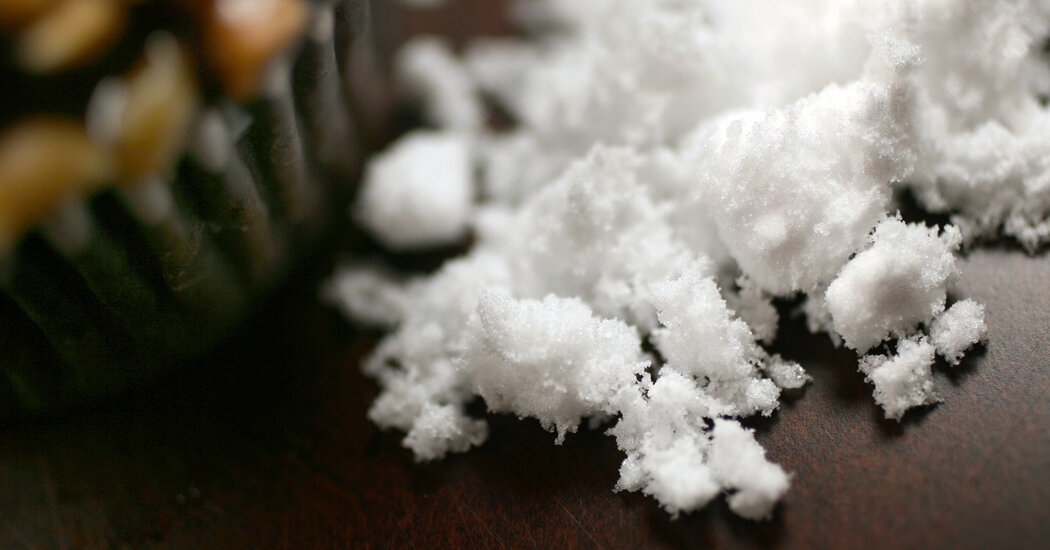A new study linking the low-calorie sugar substitute xylitol to an increased risk of heart attack and stroke has once again raised questions about the risks and benefits of sugar substitutes.
Xylitol is a sugar alcohol found naturally in fruits and vegetables and is also produced in small amounts in the human body. However, it is often synthesized and is increasingly being added to processed foods such as candy and “low-sugar” baked goods. This is because xylitol has 40 percent fewer calories than regular sugar and does not spike blood sugar levels after meals. The study authors said this increased consumption is concerning because people who are more likely to turn to sugar substitutes may already be trying to deal with conditions such as obesity and diabetes that also increase the risk of cardiovascular disease.
“Some people may think they’re making a healthier choice by choosing xylitol over sugar, but the data shows that’s not the case,” said Dr. Stanley Hazen, director of cardiovascular and metabolic sciences at the Cleveland Clinic’s Lerner Research Institute and an author of the study. Last year, Dr. Hazen and his colleagues found a similar association with another sugar alcohol called erythritol.
In the new study, researchers measured xylitol levels in plasma samples from more than 3,000 participants who had fasted overnight. They found that those with the highest xylitol levels had nearly twice the risk of heart attack, stroke or death within the next three years compared with those with the lowest levels. European Heart Journal this month.
The study doesn’t prove that sugar alcohols like xylitol and erythritol directly cause heart attacks, only that they’re associated with an increased risk. The researchers didn’t track the subjects’ diets, so other foods could also be contributing to the risk, said Marta Janina Pepino, an associate professor of food science and human nutrition at the University of Illinois at Urbana-Champaign. It’s also possible that some of the subjects naturally produce more xylitol, so the high levels aren’t just coming from food or drink, she said.
To address some of these concerns, Dr. Hazen’s team fed xylitol to mice, spiked human blood samples with xylitol in the lab, and gave 10 healthy volunteers a drink with xylitol. In all tests, they found that xylitol could increase the rate at which platelets form clots, ultimately leading to heart attacks and strokes.
Taken together, the findings suggest that xylitol may pose risks that consumers should consider. Just because sugar substitutes like xylitol contain few calories “doesn’t mean they don’t have an impact,” Dr Pepino said.
Outside experts say the next step is to compare the risks and benefits of alternatives like xylitol with regular sugar. the study Have Consistently was suggested Excessive sugar intake is associated with an increased risk of cardiovascular diseases, including heart attack and stroke.
“Xylitol may pose some risk compared to nothing, but it’s less risk than the same amount of sugar,” said Dr. David Ludwig, an endocrinologist at Boston Children’s Hospital, whose research has shown that some sugar substitutes can prevent weight gain, which is also a risk factor for cardiovascular disease. “I think the next question is, how do you assess and balance the risks?”
Xylitol in foods and beverages
To know how much xylitol you are consuming, you need to read the nutrition facts label carefully.
Foods and drinks labeled “no added sugar” or “no added sugar” must list the exact amount of sugar alcohols under carbohydrates on the Nutrition Facts label. But if a product doesn’t make these claims, it may not have to list the exact amount. This means sugar alcohols like xylitol may be lurking in many more products than consumers realize, including energy bars, nut butters, salad dressings and flavored drinks, says Dr. Hazen. Xylitol and other sugar alcohols may be found in ingredients lists simply by looking for words that end with “-ol,” such as sorbitol and maltitol. Xylitol may also be listed by other names, such as: Birch sugar or European code E967.
Xylitol is also often added to products meant to support oral health, such as mouthwash, toothpaste and sugar-free gum, but researchers don’t believe these are significant sources of xylitol intake because people ingest these products in such small amounts, Dr. Hazen said.
Reduce your reliance on sugar substitutes
If you want to limit your intake of xylitol and other sugar alcohols, start by reducing your intake of processed foods. Next, try to curb your sweet cravings, says Dr. Hazen. Instead of reaching for sugar-free snacks and desserts, consider consuming natural sweeteners like honey, maple syrup, or agave syrup in moderation.
Dr. Pepino said that even if you have diabetes, it may be better to rely on natural sugars for the occasional sweet snack, as long as you can closely monitor your blood sugar levels and adjust your medication as needed.
Eating whole fruits and vegetables is also a great way to satisfy sweet cravings while still getting the fiber and other nutrients that help regulate the effects of sugar and sugar alcohols. When baking, try recipes that use mashed fruit, like bananas and applesauce, instead of sugar or sugar substitutes.
You should also try to gradually reduce the amount of sugar and sugar substitutes in your drinks. For example, you could switch from sugar-free soda to sparkling water flavored with a splash of fruit juice.
“Sugar substitutes should only be used as a stepping stone,” says Dr. Ludwig, “and should not be considered part of a healthy low-carb diet in the long term.”

